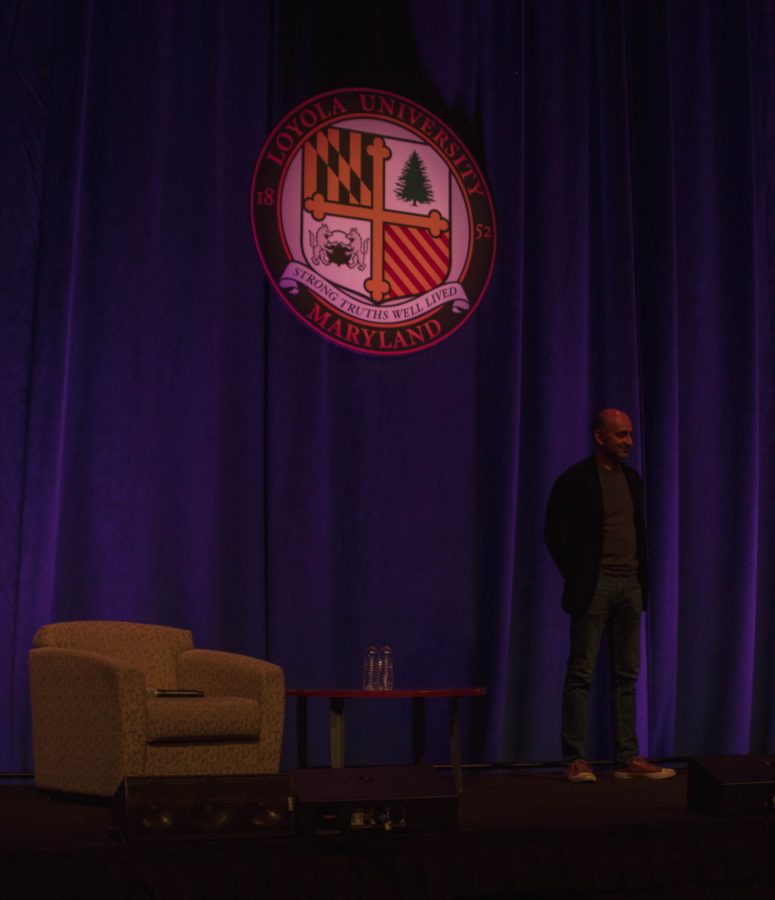On March 18, “Exit West” author Mohsin Hamid delivered the 2019 Hanway Lecture and Humanities Symposium Keynote, “Rights of Passage.” Reitz Arena was packed with students, faculty, and community members who were eager to hear the author reflect on his novel’s ability to portray the humanity in migration.
To Hamid, understanding how “Exit West” came to be is dependant upon his upbringing. “In some ways, I suppose, I was always going to write a novel about migration because my whole life has been spent, in a way, migrating,” he said. Hamid was born in Lahore, Pakistan, but moved to California as a child with his parents. At 9 years old, the “little Californian boy” moved back to Lahore where he struggled to relearn his native language, Urdu, and lost touch with everyone that he knew back in America.
Years later, Hamid returned to the United States for college and then made his way to London where he met his wife and had his first child. Hamid then returned to Pakistan in the house that he grew up in–a place in which he still resides today. His migration, in part, inspired the migration that is shown in “Exit West.”
“Given this journey through life of continuous migration, what has resulted for someone like me is that I’m quite thoroughly a kind of mongrel. I’m a hybrid,” Hamid said. “I’m neither German shepherd nor a poodle nor a labrador. I’m kind of a mutt, and for a while, I imagined that this was a kind of handicap.”
Hamid said he learned to be a “chameleon” who changed himself for the surroundings he was in. If he were in Pakistan, he would be one person. If he were in America, he would be another. As he got older, he became content with the fact that he was this “mongrelized hybrid.”
“When I gave myself permission to be a little bit weird, this kind of strange American, Pakistani, maybe a little bit British hybridized being, something opened up for me,” he said. “By allowing myself to be this kind of weird, out-of-place person, I began to recognize that pretty much everyone else also feels like they are a weird, out-of-place person.”
By gaining this world view, combined with the world’s climate of immigration and the question of figuring out who the “real” natives of a country are, the acclaimed novel was born.
“We live now in a moment where people are talking about the ‘real folk,’ the ‘real people,’ the ‘true citizens’ of a country, which I think is very dangerous because very quickly you find nobody is real enough,” he said. “And so being a novelist, it seemed to me that the necessary thing was to write a novel about it. And that’s where ‘Exit West’ comes from.”
“Exit West” focuses on the journey of Saeed and Nadia, two young people who come from a country that becomes dangerous after militants take over. The two escape through doors that act as a magical way of transportation between countries. Hamid said he is often asked why he chose to use these doors in his novel.
“I think we often forget that what we call reality isn’t actually real,” he said. “In the novel, what I tried to do was introduce these doors that slightly put a skew on what reality is.” Technology, he said, is sort of like our own door that can transport us from one place to another with just a tap of a finger. These “black rectangles,” or our cell phones, have the ability to give us a new type of migration.
“What happens with these black rectangles is that we use them to send our consciousness away from the geographic location of our body,” Hamid said. “So I thought, well, what does that feel like? How do we understand that? Maybe what we can do is make the black rectangle just a little bit bigger and let people walk through it. And the black doors of the novel were born.”
To Hamid, compressing time was another reason why the doors became logical for the novel. “Holding our attention today for a few hours to read a novel is struggling against a million demands,” he said. “It would have to go in small and expand inside the reader into something big. And so the doors allowed me to do that.”
The novel, although a tale of migration and escape, is also a story of first love. In particular, Hamid said that it is a love story of “letting go.” He said he wanted to explore a kind of love that is “non-possessive,” in which two people can let go easily. “How can a relationship itself be a kind of migration?” he said.
To end his talk, Hamid called on “critical optimism” to help change the future for the better, and to recognize that “every single one of us” is a migrant.
“It is very important now, I think for everyone–for me as a novelist, for each of you–to begin to imagine plausible, desirable futures,” he said. “Plausible, desirable futures that are more inclusive, that are more equal, that open up the possibilities of humanity to everyone. And so ‘Exit West,’ in some senses, is that.”
In 2019, the Hanway Lecture in Global Studies and the Keynote Address for the Humanities Symposium were combined.
Image Courtesy of Greyhound News



















































































































